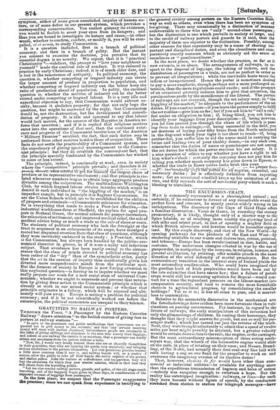GRATUITIES TO RAILWAY PORTERS. '
THHATJGH the Times, "A Passenger by the Eastern Counties Railway" draws attention "to the foolislicustom of giving fees to porters at railway stations "—
ince we can eak. fro
" In spite of the prominent and public notifications that 'passengers are re- quested not to give money to the servants,' and that 'any servant receiving money will meet with instant dismissal,' inconsiderate people are constantly in the habit of giving shillings and sixpences to the men who convey their luggage; and indeed on one railway the custom is so notorious, that a passenger can hardly obtain any assistance front the porters without a bribe.
"Now,. Sir, I would very briefly remind those who are so absurdly thoughtless
in their gratuities, that they are injuring the public very materially, and bringing serious nnsfortnne to the porters themselves. Let this pernicious practice become a little more common than it now is' and railway boards will, as a matter f course, allow the public to take off their hands the entire expense of the porters and station police. Like the waiters at coffeehouses and tea-gardens, they will buy the situations for which they now receive salaries, which in that case they will obtain from the travelling public.
"Let me also remind railway porters, guards, and police, of the old, stage-coach travelling, and of the beggarly wages given in those days, in consideration of the
thek praetase; splace, the general civility among porter& on the Eastern Counties Rail.. way as well as others, even when there has been no symptom of fee-giving. There may occasionally be a distinction of manner unfavourable to those who are " only " second-class passengers. but the distinction is one which prevails in society at large, and to the credit of railway porters and guards be it said, that the majority of them are superior to the distinction. Possibly, among other reasons for that superiority may be a sense of sharing Im- portant and disciplined duties, and even the cleanliness and com- paratively comely costume which BO obviously aid the sense of seemliness or " gentlemanliness." In the next place, we doubt whether the practice, so far as it now extends, is an abuse. The arrangements of railways, in re- spect to the disposal of luggage, the taking of tickets, and the distribution of passengers in a train, are not so perfect in order as to prevent all irregularities ; while the inevitable haste taxes the infirm or inexperienced. Hence the porter is sometimes mesdesire to pay a more emphatic, though perhaps not a more prolonged than the mere regulations could excite ; and if the prospect of an occasional gratuity induces him to give that attention, the parsimonious profit by the munificence of the liberal. 'afylieinpoLtte porters of railways are not overpaid, though the set salary m
higglinss of the market,' be adequate to the performance of the set duties. If you exact no more—if you leave the porter simply to fulfil the set routine—give him no fee ; but if you ask him to "call a cab," feel under an obligation to him ; if, being blind, you ask
eh him utso identify your luggage from your description—if, beingnIr , you let him protect you through the chaos of life which. is pass-
ing from train to carriage,—if, being successful in the field, you are desirous of laying your fifty brace from the North unbruised
in the dog-cart which your tiger is too short to reach—if, being patriarchal, you suffer him to aid the nurse- maid in carrying the twins and leading two of your chubby dozen,—in any such case,
remember that the duties of nurse or gamekeeper are not among the set duties for which the porter receives his set salary. It is a nice question of ethics to say whether you have a right to ask him what's o'clock : certainly the company does not pay him for telling you whether much company has
t eo lsktit_g.o ne down to Epsiin,or whether ttetradeinEscx :alveslooksbrisk this ear.myitoiztorafreiupropefoot. asentiaand necessary duties ; he is effectively forbidden from expecting
more ; .but an occasional windfall keeps up his animation of ser- vice, and fitly rewards the sort of servitorial piety which is such a blessing to travellers.


























 Previous page
Previous page